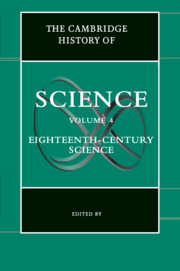1 - Introduction
Published online by Cambridge University Press: 28 March 2008
Summary
“Was ist Aufklärung?” asked Immanuel Kant in 1784, and the issue has remained hotly debated ever since. Not surprisingly, therefore, if we now pose the further question “What was Enlightenment science?” the uncertainties are just as great – but here the controversies assume a different air.
Studies of the Enlightenment proper paint the Age of Reason in dramatic hues and reflect partisan viewpoints: some praise it as the seedbed of modern liberty, others condemn it as the poisoned spring of authoritarianism and alienation. Eighteenth-century science, by contrast, has typically been portrayed in more subdued tones. To most historians it lacks the heroic quality of what came before – the martyrdom of Bruno, Galileo’s titanic clash with the Vatican, the “new astronomy” and “new philosophy” of the “scientific revolution,” the sublime genius of a Descartes, Newton, or Leibniz. After that age of heroes, the eighteenth century has been chid for being dull, a trough between the peaks of the “first” and the “second” scientific revolution, a lull before the storm of the Darwin debate and the astounding breakthroughs of nineteenth-century physics. At best, dwarves were perched on giants’ shoulders. “The first half of the eighteenth century was a singularly bleak period in the history of scientific thought,” judged Stephen Mason; the age was marked, thought H. T. Pledge, by “an element of dullness,” due in part to its “too ambitious schemes” and its “obstructive crust of elaboration and formality.”
- Type
- Chapter
- Information
- The Cambridge History of Science , pp. 1 - 20Publisher: Cambridge University PressPrint publication year: 2003
References
- 10
- Cited by



